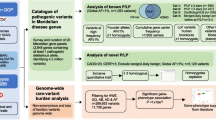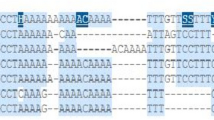Abstract
Purpose
The present study is a case–control analysis of a SNP (rs28368082) in exon 7 of the SPO11 gene and its possible association with male infertility in three provinces of Iran. We also searched for genetic differences among populations.
Methods
Using Polymerase Chain Reaction-Restriction Fragment Length Polymorphism (PCR-RFLP) analysis, we genotyped 113 infertile men and 50 fertile controls. Then, samples consisting SNP, as determined by PCR-RFLP, were genotyped by sequencing. The differences in genotype distributions between cases and fertile controls were examined using Chi-squared analysis. The genetic difference between individuals with mutated nucleotide was investigated by phylogenetic trees. Genetic difference among populations (provinces) was analyzed through ANOVA test, and homogeneity was investigated using STRUCTURE and K-means clustering analysis.
Results
According to the statistical analysis, the SNP was significantly associated with male infertility in all populations except oligozoospermic cases of the Center region. The phylogenetic trees showed partial genetic variation among the individuals, although ANOVA test showed no significant genetic difference between populations (provinces) for both azoospermic, and oligozoospermic cases. Eventually, we affirmed that individuals in the inclusive populations had genetic difference, but it was not statistically significant for dividing underlying populations to separate groups, so each population was homogenous.
Conclusion
Our study indicates that the mentioned polymorphism in SPO11 gene may be linked to the susceptibility of azoospermia and oligozoospermia male infertility in three provinces of Iran. Further studies are required to support obtained results. It finally should be noted that the possible association between a particular SNP and a specific disease completely depends on the underlying population.




Similar content being viewed by others
References
Zheng K, Yang F, Wang PJ. Regulation of male fertility by X-linked genes. J Androl. 2010;31(1):79–85.
Rowe PJ, Comhaire FH, Hargreave TB, Mahmoud AMA. WHO manual for the standardized investigation, diagnosis and management of the infertile male. Cambridge: Cambridge University Press; 2000.
Irvine DS. Epidemiology and aetiology of male infertility. Hum Reprod. 1998;1(13 Suppl):33–44.
Zhang J, Qiu SD, Li SB, Zhou DX, Tian H, Huo YW, et al. Novel mutations in ubiquitin-specific protease 26 gene might cause spermatogenesis impairment and male infertility. Asian J Androl. 2007;9:809–14.
Shamsi MB, Kumar K, Dada R. Genetic and epigenetic factors: role in male infertility. Indian J Urol. 2011;27(1):110–20.
Ferlin A, Raicu F, Gatta V, Zuccarello D, Palka G, Foresta C. Male infertility: role of genetic background. Reprod Biomed Online. 2007;14:734–45.
O’Flynn O’Brien KL, Varghese AC, Agarwal A. The genetic causes of male factor infertility: a review. Fertil Steril. 2010;93:1–12.
Wilson GR, Sim ML, Brody KM, Taylor JM, McLachlan RI, O’Bryan MK, et al. Molecular analysis of the PArkin co-regulated gene and association with male infertility. Fertil Steril. 2010;93:2262–8.
Prieler S, Penkner A, Borde V, Klein F. The control of Spo11’s interaction with meiotic recombination hotspots. Genes& Development. 2005;19:255–69.
Baudat F, Manova K, Yuen JP, Jasin M, Keeney S. Chromosome synapsis defects and sexually dimorphic meiotic progression in mice lacking SPO11. Mol Cell. 2000;6:989–98.
Romanienko PJ, Camerini-Otero RD. Cloning, characterization and localization of mouse and human SPO11. Genomics. 1999;61:156–69.
Carrell DT, De Jonge C, Lamb DJ. The genetics of male infertility: a field of study whose time is now. Arch Androl. 2006;52:269–74.
Zhang J, Zhou D, Wang H, Tian Z. An association study of SPO11 gene single nucleotide polymorphisms with idiopathic male infertility in Chinese Han population. J Assist Reprod Genet. 2011;28:731–6.
World Health Organization. WHO laboratory manual for the examination of human semen and semen-cervical mucus interaction. 4th ed. Cambridge: Cambridge University Press; 1999.
Peakall R, Smouse PE. GenAlex6: genetic analysis in excel population genetic software for teaching and research. Mol Ecol Notes. 2006;6:288–95.
Pritchard JK, Stephens M, Donnelly P. Inference of populations structure using multilocus genotype data. Genetics. 2000;155:945–59.
Caliński T, Harabasz J. A dendrite method for cluster analysis. Commun Stat. 1974;3:1–27.
Schwarz G. Estimating the dimension of a model. Ann Stat. 1978;6:461–4.
Podani J. Introduction to the exploration of multivariate data. English translation. Leide, Backhuyes Publisher. 2000; p. 407.
Nishimune Y, Tanaka H. Infertility caused by polymorphisms or mutations in spermatogenesis-specific genes. J Androl. 2006;27:326–34.
Acknowledgments
We acknowledge Shahid Beheshti University for supporting this study. Special thanks to Dr. Mohseni for helping in performing the study. We thank all the clinicians (Mrs. Mokhtari and et al.) who provided samples for this study from the Molecular laboratory unit of the Royan Institute of Tehran. We also thank patients and volunteers for their participation in the study.
Author information
Authors and Affiliations
Corresponding author
Additional information
Capsule
A case–control study was designed to investigate the possible association between an SNP in SPO11 gene and azoospermia, oligozoospermia male infertility in three provinces of Iran, according to our data the SNP was associated with male infertility in all populations except oligozoospermic cases of the Center region.
Rights and permissions
About this article
Cite this article
Ghalkhani, E., Sheidai, M., Gourabi, H. et al. Study of single nucleotide polymorphism (rs28368082) in SPO11 gene and its association with male infertility. J Assist Reprod Genet 31, 1205–1210 (2014). https://doi.org/10.1007/s10815-014-0279-z
Received:
Accepted:
Published:
Issue Date:
DOI: https://doi.org/10.1007/s10815-014-0279-z




